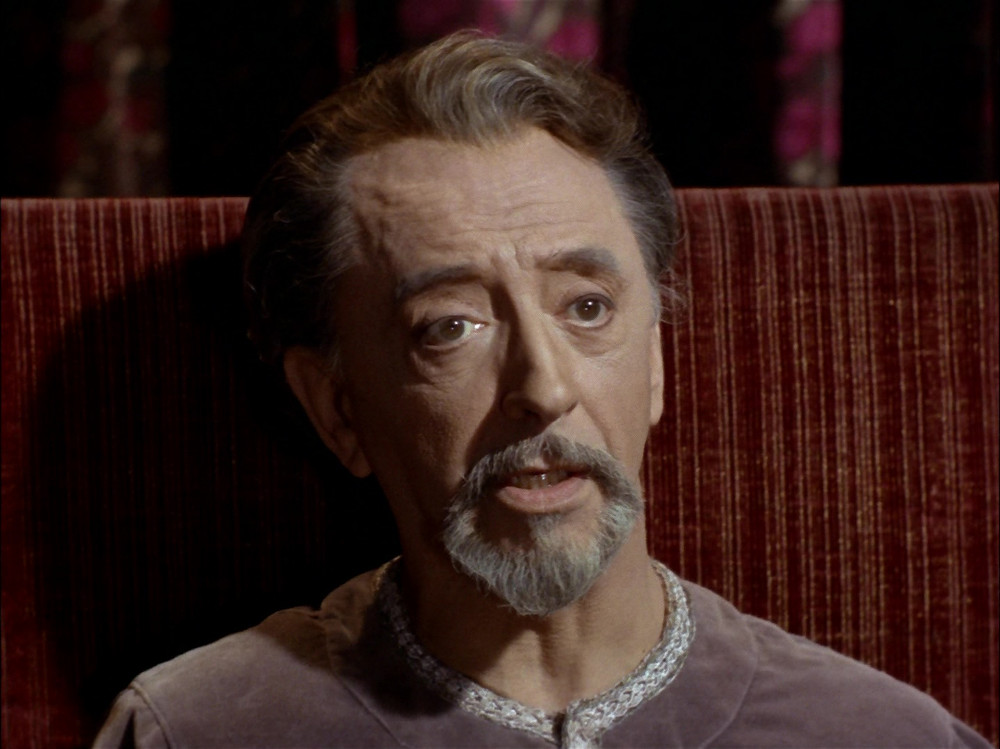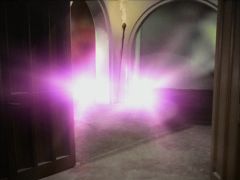Difference between revisions of "Ayelborne"
m |
m |
||
| (5 intermediate revisions by the same user not shown) | |||
| Line 1: | Line 1: | ||
| − | {{ImageInfoBox2|name=Ayelborne|file=ayelborne-tos-27.jpg|caption=Ayelborne ( | + | {{MyriadAyelborne}} |
| − | {{ | + | {{ImageInfoBox2|name=Ayelborne|file=ayelborne-tos-27.jpg|caption=Ayelborne ({{TOS27}})}} |
| − | {{ | + | {{Species|[[Organians|Organian]]}} |
| − | {{ | + | {{First|{{TOS27}} ({{date|Production|1967|3|23}})}} |
| − | {{ | + | {{Portrayed|[[Jon Abbott]]}} |
| + | {{Ad|AmazonTOSBD}} | ||
|}</div> | |}</div> | ||
| − | Ayelborne, along with all other [[Organians]], welcomed representatives of both the [[United Federation of Planets]] and the [[Klingon Empire]] to his planet in [[2267]]. Ayelborne ignored strong warnings from Federation representative and Starship [[U.S.S. Enterprise NCC-1701|''Enterprise'']] [[Starfleet Captain|Captain]] [[Kirk, James T.|James T. Kirk]] that Klingon occupation would have potentially disastrous consequences to the apparently technologically unsophisticated Organian people. It was later revealed that the Organians were an incredibly advanced civilization of noncorporeal life-forms who had been masquerading as humanoids in order to make it easier for the Federation and Klingon representatives to deal with them. Ayelborne predicted that the Federation and Klingon antagonists would eventually become fast friends.<ref name="TOS27"/> | + | {{banner|Prime}} |
| + | Ayelborne, along with all other [[Organians]], welcomed representatives of both the [[United Federation of Planets]] and the [[Klingon Empire]] to his planet in [[2267]]. Ayelborne ignored strong warnings from Federation representative and Starship [[U.S.S. Enterprise NCC-1701|''Enterprise'']] [[Starfleet Captain|Captain]] [[Kirk, James T.|James T. Kirk]] that Klingon occupation would have potentially disastrous consequences to the apparently technologically unsophisticated Organian people. It was later revealed that the Organians were an incredibly advanced civilization of noncorporeal life-forms who had been masquerading as [[humanoids]] in order to make it easier for the Federation and Klingon representatives to deal with them. Ayelborne predicted that the Federation and Klingon antagonists would eventually become fast friends.<ref name="TOS27"/> | ||
| + | {{clear|left}} | ||
| + | ==Image Gallery== | ||
| + | <gallery mode="packed"> | ||
| + | organians_energy-tos27.jpg|Ayelborne (left) and [[Trefayne]] in their natural form ({{TOS27}}) | ||
| + | </gallery> | ||
{{References}} | {{References}} | ||
<references> | <references> | ||
| Line 13: | Line 20: | ||
[[Category:People]] | [[Category:People]] | ||
[[Category:Organians]] | [[Category:Organians]] | ||
| + | [[Category:Noncorporeal Beings]] | ||
[[Category:TOS]] | [[Category:TOS]] | ||
[[Category:Film]] | [[Category:Film]] | ||
[[Category:Prime Timeline]] | [[Category:Prime Timeline]] | ||
[[Category:Klingon War (2267)]] | [[Category:Klingon War (2267)]] | ||
Latest revision as of 08:38, 27 August 2023
| Species | Organian |
| First Appearance | TOS27 (23 Mar 1967) |
| Portrayed by | Jon Abbott |
| Advertising |
Ayelborne, along with all other Organians, welcomed representatives of both the United Federation of Planets and the Klingon Empire to his planet in 2267. Ayelborne ignored strong warnings from Federation representative and Starship Enterprise Captain James T. Kirk that Klingon occupation would have potentially disastrous consequences to the apparently technologically unsophisticated Organian people. It was later revealed that the Organians were an incredibly advanced civilization of noncorporeal life-forms who had been masquerading as humanoids in order to make it easier for the Federation and Klingon representatives to deal with them. Ayelborne predicted that the Federation and Klingon antagonists would eventually become fast friends.[1]
Image Gallery
Notes and References
- ↑ Roddenberry, Gene (Executive Producer). "Errand of Mercy." Star Trek, Season 1, Episode 26 (Production 27). Directed by John Newland. Written by Gene L. Coon. Desilu Productions, 23 March 1967.


